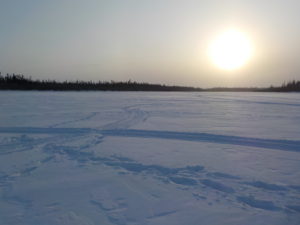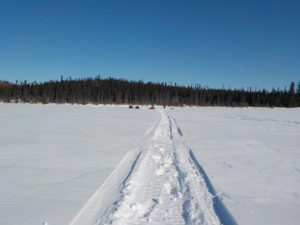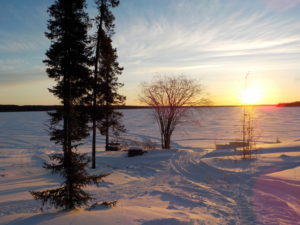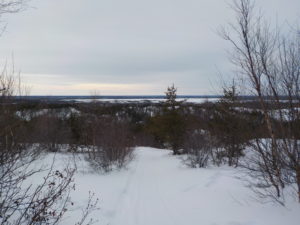By Joseph Dipple, Ph.D. Candidate Department of Native Studies
University of Manitoba
My research focuses on relationships with the land and its connection to the inherent rights of Indigenous communities and nations to self-government. In particular, I am looking at how Manitoba Hydro’s operations in the north are impacting relationships with the land and as a result the ability of communities to self-govern.
One of the most important aspects of this research has been learning about relationships with the land by being on the land with Elders, harvesters, land-users, knowledge holders, and Indigenous community members in their territory. I have been lucky enough to receive funding from Wa Ni Ska Tan and the Northern Scientific Training Program to travel on the land to Recluse Lake and the Little Churchill River with people from Tataskweyak Cree Nation, throughout the Gillam area with Elder Noah Massan from Fox Lake, and around South Indian Lake with Elders and land-users from South Indian Lake and O-Pipon-Na-Piwin Cree Nation.
In March, 2019, I had the opportunity to travel to Recluse Lake in the Split Lake Resource Management Area. In order to do this trip, three of us traveled approximately 100 kilometers from Split Lake by snowmobile through bush trails and over lakes and rivers. This trip was not only my first time traveling on the land in March, but was also my first time every traveling on or driving a snowmobile. Luckily, the people with whom I traveled coached me through the process of buying a winter jacket, boots, snowmobile pants, and other necessities for being out on the land in the winter. However, not knowing how to drive a snowmobile was a real challenge and the first hour of our five-hour trip north was exhausting and difficult. After the first five-hour day, I started to understand better how to pilot the snowmobile and the following day on Recluse Lake and the trip back were significantly better. Learning by doing was extremely difficult for me but after my experiences on the snowmobile I became significantly more capable, so much so that the five-hour trip north only took three hours on our return trip.
During our time at Recluse Lake, we set a net using an auger to drill holes in the ice and a “jigger” to create a second hole for the net. This opportunity was very interesting for me as I have never tried setting a net under ice before. We were lucky to have a relatively calm day on our second day out and were able to find the “jigger” on our first try. As a result of setting the net relatively easily, we were able to not only set it once but reset it after our first check. I never expected the net to be as heavy or resistant to being pulled as it was but I was given the job of pulling the net both times and it reminded me just how much strength is necessary to successfully live off the land.
We also had the opportunity to travel extensively around the lake and surrounding rivers and streams. We learned about the many different trails throughout the area as well as where they lead and interesting stories about the late Elders who traveled these trails in the past. It never failed that we would be traveling through the bush or on river and lake trails and I would be completely lost. After many winding turns and somewhat overgrown bush trails we would appear either near our camp or on a river that I recognized. Throughout the trip I learned to recognize bush trails and at least some of the lakes and rivers near the camp, but I am certain I would have easily been lost if I had not had people to follow.
Throughout our trip, we saw many fresh tracks of moose, wolves, wolverine, and other animals and learned a great deal about the relationships the late Elders had with this land as well as the relationships that people in Tataskweyak are creating and maintaining today. Below are some images from that trip. Recluse Lake and the trails that lead to it from Split Lake are beautiful territories with a strong sense of power about them. This trip taught me a great deal about not only the importance of this land to the people of Tataskweyak Cree Nation, but also the importance of the relationships people have with this land.

Ice fishing near dusk

Setting a net on Recluse Lake

View of Recluse Lake

View from the top of Limestone Hill

